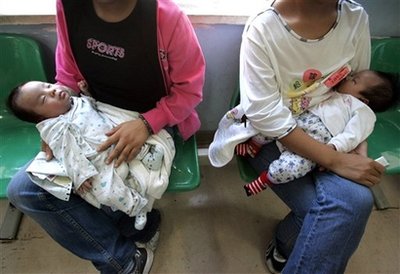Biz Unusual
Safety worries stall selling of human breast milk
By Xu Junqian (China Daily)
Updated: 2011-06-11 10:28
 |
Large Medium Small |
SHANGHAI - Amid growing concern about food safety problems across the country, customers are most concerned about dairy products, leading to a "black market" in human breast milk.
While some mothers have turned to imported formulas to feed their babies, others are selling their own breast milk online to make some extra money and help mothers who are not producing enough milk of their own.
 A Chinese mother breastfeeds her baby at the Children's hospital in Beijing September 22, 2008. [File/Agencies] |
On some of the most popular shopping websites like taobao.com, mothers who claim to have an over-supply of milk are selling fresh human breast milk frozen in special storage bags.
Prices range from 39 yuan ($6) to 100 yuan, depending on the freshness of the milk. Most of these milk donors are from big cities such as Shanghai, Beijing and Shenzhen. But most sellers only accept deals within their own city so that the milk will not deteriorate while being delivered.
| ||||
The new product soon attracted wide attention and invited a nationwide media blitz questioning the freshness and purity of the milk. This publicity caused most sellers to drop their offers on taobao.com.
However, some new mothers are still posting notices on online parenting forums offering to sell their "excessive milk".
A mother in Shanghai, who gave her surname as Hu, wrote in a notice on Ganji.com that her refrigerator was full of her breast milk, and she would sell it for 20 yuan for a 100-milliliter bag.
Each bag was labeled with the date it was expressed, and details about the size and brand of the storage bags were provided in the notice.
But Hu said that she has not sold a single bag since she posted the notice a week ago.
"That's fine," Hu said. "We don't need that money to live on. We just didn't want to see the precious milk going down the drain."
Huo Xiaohua, a Shanghai native who gave birth to a boy a week ago, said she would never feed her baby with anything produced by other people, let along strangers.
"It's creepy," the 27-year-old mother said. "If I didn't produce enough milk, I would prefer imported powdered milk. Who knows what's inside those bags?"
According to a regulation introduced by the Ministry of Health, human breast milk is categorized as a "special food source" that cannot be used as a commodity for sale or manufacturing.
Zhang Junping, a gynecologist at the Obstetrics and Gynecology Hospital affiliated to Fudan University, said he thinks the health of the milk donor and the risk of babies being allergic to the milk are the greatest concerns.
"Despite the fact that the milk sold online is produced by new mothers who are breastfeeding their own babies, different babies need different kinds of nutrition, which can only be met by their biological mother's milk," Zhang said.
"Besides, the bonding between mom and baby promoted by breastfeeding sometimes is more important than the milk itself."
But Zhang said that most hospitals in China do not have breast milk banks, a popular measure adopted by foreign countries to help new mothers who are not producing enough milk.
As early as 2007, a Breast Feeding Association, the first of its kind in the country, was founded in Ningbo by the local government to facilitate the setting up of the first breast milk bank in China.
But the plan failed for various reasons including a lack of legal regulations and capital.
| 分享按钮 |



